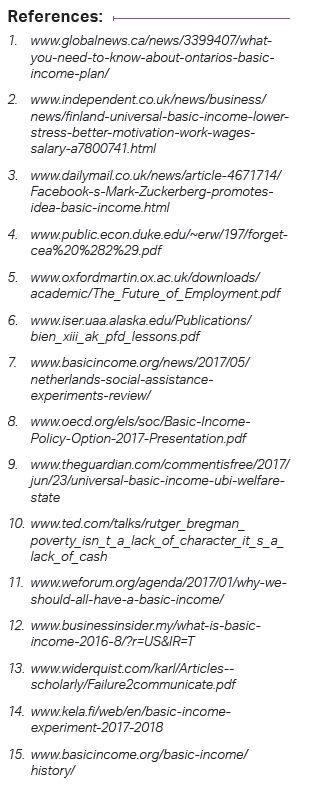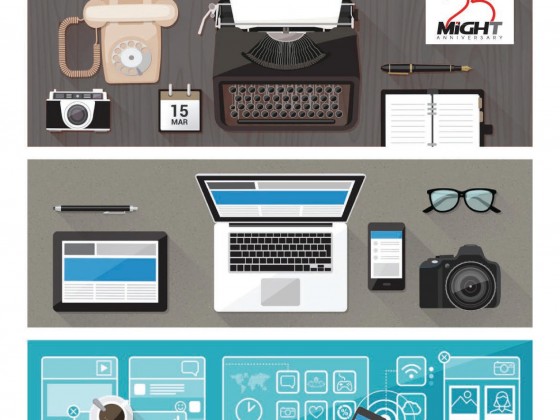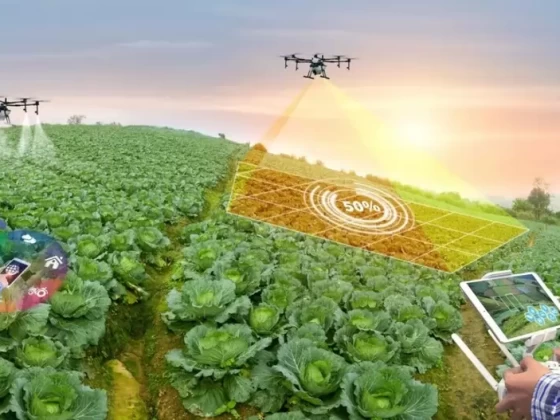by | Mohd Hasan Mohd Saaid | hasan@might.org.my
As automation technologies take over tasks previously performed by humans, their potential effect on employment and wages is becoming a major focus of research and public concern. Where machines could replace humans, the question arises—how do we help people most affected by automation? A highly cited study by Oxford University academics estimates 47 percent of total U.S. employment is in the high risk category where associated occupations could be automated relatively soon, perhaps over the next decade or two. Billionaire entrepreneur Elon Musk, while speaking at the World Government Summit in Dubai earlier this year, warned that a universal basic income will become necessary as people’s jobs are increasingly replaced by
robots.
Unconditional or universal basic income, or UBI has been getting renewed interests and attention in recent years. Universal basic income is an approach to economic security in which a fixed amount of money, at a level sufficient for subsistence, is given by the government to all its citizens regardless of income or work status, no strings attached. This idea is not new; in fact, basic income has far older roots, dating back to the 16th century when the idea of a minimum income first appeared. At the end of the 18th century, the idea of an unconditional one-off grant first appeared. And the two were combined for the first time to form the idea of an unconditional basic income near the middle of the 19th century.
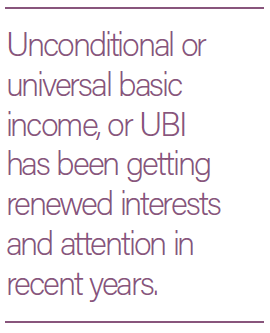 Between 1968 and 1980, the U.S. Government experimentally tested a version of basic income. The debate died down without a clear consensus on what the results of the experiments implied for policy, although the results continued to be cited as evidence for the viability or the non- viability of a guaranteed income both by its proponents and opponents. Meanwhile in Canada, between 1974 and 1979, a field experiment on guaranteed annual income called MINCOME was conducted in Dauphin, a small farming town in the province of Manitoba. The results suggest the safety net could carry social benefits that save money in the long term—a majority of the participants kept working, teenage children stayed in high school longer, and hospitalisations fell significantly, especially for mental health problems.
Between 1968 and 1980, the U.S. Government experimentally tested a version of basic income. The debate died down without a clear consensus on what the results of the experiments implied for policy, although the results continued to be cited as evidence for the viability or the non- viability of a guaranteed income both by its proponents and opponents. Meanwhile in Canada, between 1974 and 1979, a field experiment on guaranteed annual income called MINCOME was conducted in Dauphin, a small farming town in the province of Manitoba. The results suggest the safety net could carry social benefits that save money in the long term—a majority of the participants kept working, teenage children stayed in high school longer, and hospitalisations fell significantly, especially for mental health problems.
Later, in 1982, Alaska implemented its own brand of basic income called Permanent Fund Dividend (PFD) which is derived from earnings on investment of the Alaska Permanent Fund (APF), a portfolio of diversified assets. Since market fluctuations affect APF investments, the size of the annual payment fluctuates from year to year. Notably, the dividend is one contributing factor to the decline in Alaska’s poverty rate, particularly among the Native Americans. The Native American poverty rate fell from 25 percent to 19 percent between the census years of 1980 and 1990. A study of the early dividend program in 1984saw only 1 percent of Alaskans surveyed reported they worked less because of the dividend.
Full UBI experiments have been carried out more recently in places such as Namibia, India and Brazil. Other countries and organisations are following suit experimenting with UBI in varying degrees. In Finland, a basic income experiment is currently being conducted among 2,000 persons between ages 25 and 58 selected at random, who will receive a monthly basic income of 560 euros for two years (1 January 2017 – 31 December 2018). The experiment is carried out by Kela—Finland’s Social Insurance Institution. The purpose of the study is to examine the impact of basic income. One of the topics studied is whether there are differences in employment rates between those receiving and those not receiving a basic income. Proposed social assistance experiments in Netherlands, in several Dutch municipalities, are still under review by the Dutch Ministry of Social Affairs. However, these experiments will not test a full-fledged basic income but rather the effects of reducing conditions on welfare benefits. Canada’s province of Ontario started a pilot programme in April that provides 4,000 low-income residents with an unconditional income; the level of support comes up to just under 17,000 Canadian dollars per year, less 50 percent of any income they earn. A nonprofit organisation called GiveDirectly have launched the world’s first true universal basic income experiment. The 30 million U.S. dollar programme will distribute an unconditional monthly benefit to 6,000 people in sub-Saharan Africa, and it will last ten to fifteen years.
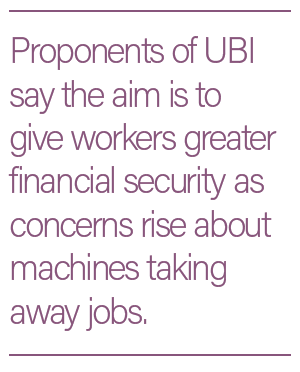 Proponents of UBI say the aim is to give workers greater financial security as concerns rise about machines taking away jobs. The most substantial benefit would be the elimination of households living below the poverty line, which would afford everyone a base level of income security. Dutch journalist Rutger Bregman when speaking about basic income at TED2017 in Vancouver, did not frame basic income as a response to technological unemployment. Instead, he argued that poverty simply results from a lack of cash, and that the best way to end poverty is just to give money to the poor. Many believe it will also result in an explosion in creativity, entrepreneurship, and research—a notion supported by billionaire founder of Facebook Mark Zuckerberg. He said people think and work differently when they have their basic needs met, and having that allows and encourages reativity and innovation.
Proponents of UBI say the aim is to give workers greater financial security as concerns rise about machines taking away jobs. The most substantial benefit would be the elimination of households living below the poverty line, which would afford everyone a base level of income security. Dutch journalist Rutger Bregman when speaking about basic income at TED2017 in Vancouver, did not frame basic income as a response to technological unemployment. Instead, he argued that poverty simply results from a lack of cash, and that the best way to end poverty is just to give money to the poor. Many believe it will also result in an explosion in creativity, entrepreneurship, and research—a notion supported by billionaire founder of Facebook Mark Zuckerberg. He said people think and work differently when they have their basic needs met, and having that allows and encourages reativity and innovation.
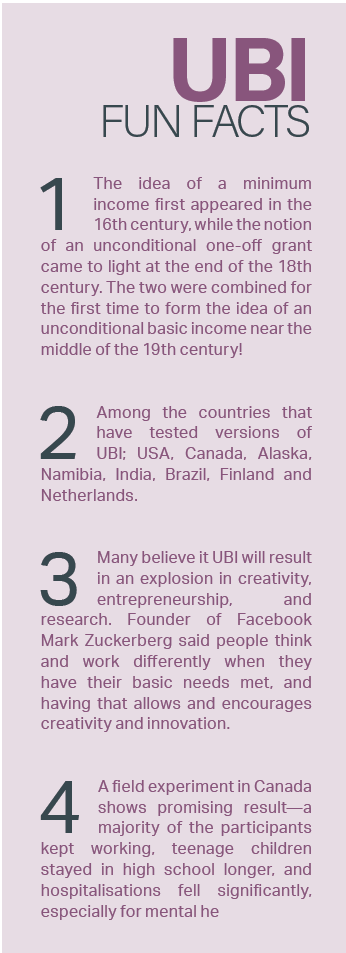 Many opponents of UBI believe an unconditional benefit would disincentivise productivity and work, though early experiments have shown these concerns are unsubstantiated. Some argue a global benefit could result in inflation. Then there is the critical point of how it would be funded, and the feasibility of governments to afford UBI in perpetuity. Due to the inherent scale of a universal income, funding would have to come from a variety of sources, extending beyond taxing incomes to methods of taxing forms of wealth including, but not limited to, land-value taxation, transaction taxes, carbon taxes, natural resource royalties, and taxation of corporate stock.
Many opponents of UBI believe an unconditional benefit would disincentivise productivity and work, though early experiments have shown these concerns are unsubstantiated. Some argue a global benefit could result in inflation. Then there is the critical point of how it would be funded, and the feasibility of governments to afford UBI in perpetuity. Due to the inherent scale of a universal income, funding would have to come from a variety of sources, extending beyond taxing incomes to methods of taxing forms of wealth including, but not limited to, land-value taxation, transaction taxes, carbon taxes, natural resource royalties, and taxation of corporate stock.
A new study by the Organisation for Economic Cooperation and Development (OECD), released in June this year, concluded that at current spending levels, a basic income would be well below the poverty line. Correspondingly, a basic income adequate to reduce poverty would require substantial increases in taxation. Even in the latter case, the risk of poverty might actually increase, as people lose their existing benefits in favour of UBI. Their conclusion is based on analysing the effects of a scenario in which all existing cash and tax benefits for those under 65 would be converted into a UBI in 35 OECD member countries. Based on the findings, OECD suggested a partial basic income could be an option—instead of replacing existing benefits, introduce basic income as an additional transfer, or make basic income available only for a certain number of years during an individual’s lifetime, maybe with restrictions.
As the world stands on the brink of the Fourth Industrial Revolution, we need to explore innovations in policies to ensure the sustainability of social security systems, and the distribution of income. Certainly, the concept of universal basic income is going to be debated and discussed over the next twenty to thirty years as this evolution takes place. The scope of discussion has been not only about wealth redistribution as a response to mass automation but also about how modern societies can continue to create jobs while pushing technological advances such as burger-cooking robots, tax preparation artificial intelligence platforms, and driverless trucks.
